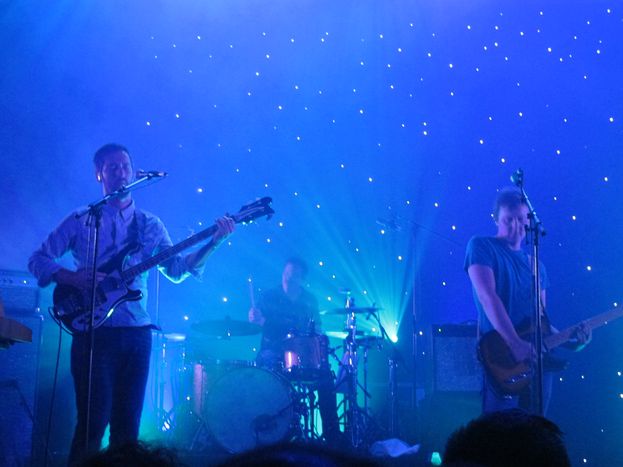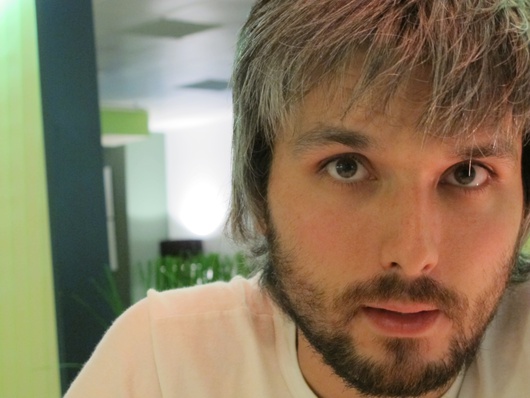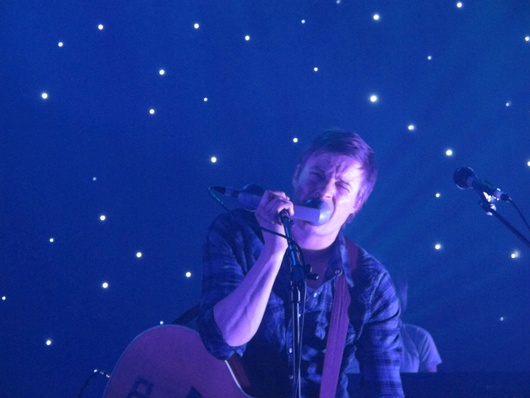
Girls in Hawaii: The band that survived
Published on
When the drummer passed away in a car accident three years ago, Girls in Hawaii thought it was over. They were at their best and suddenly, silence. Now, the band gets back on stage, ready to tell the world that "it's not over, they've survived and there's hope".
 They’re called Girls in Hawaii but they’re not girls, nor do they come from Hawaii. The six members of the Belgian indie-pop band that survived a long period of silence are Antoine, Lionel, Brice, Daniel, François and Boris. Now, one year after they released their last album, Everest, the band is getting ready to go on an acoustic tour next autumn, performing on thirty stages in France, Belgium and Switzerland. “The name is like an invitation to the journey,” says François Gustin, guitarist and keyboard player of the band, before their performance begins at Clemont Ferrand’s Europavox Festival. “They got bored a lot, lived in a small city from the south of Brussels and wanted a name that didn’t resemble them: young guys from the suburbs of Brussels, a place where nothing ever happens”. François speaks Spanish fluently because, as he tells me, he spent some time in Santiago de Compostela when he was studying translation and interpreting. He speaks quietly, he thinks of what he’s going to say and is not afraid of showing himself as he is or revealing his feelings. François is as natural as the band. When I ask him about what defines Girls in Hawaii, he states: “We are authentic, we don’t try to make music that don’t resemble us. We’re 100% honest, we don’t have a marketing plan or care much about our image, we don’t really care about it. Music and what we can transmit to the audience when we play live is all that matters”.
They’re called Girls in Hawaii but they’re not girls, nor do they come from Hawaii. The six members of the Belgian indie-pop band that survived a long period of silence are Antoine, Lionel, Brice, Daniel, François and Boris. Now, one year after they released their last album, Everest, the band is getting ready to go on an acoustic tour next autumn, performing on thirty stages in France, Belgium and Switzerland. “The name is like an invitation to the journey,” says François Gustin, guitarist and keyboard player of the band, before their performance begins at Clemont Ferrand’s Europavox Festival. “They got bored a lot, lived in a small city from the south of Brussels and wanted a name that didn’t resemble them: young guys from the suburbs of Brussels, a place where nothing ever happens”. François speaks Spanish fluently because, as he tells me, he spent some time in Santiago de Compostela when he was studying translation and interpreting. He speaks quietly, he thinks of what he’s going to say and is not afraid of showing himself as he is or revealing his feelings. François is as natural as the band. When I ask him about what defines Girls in Hawaii, he states: “We are authentic, we don’t try to make music that don’t resemble us. We’re 100% honest, we don’t have a marketing plan or care much about our image, we don’t really care about it. Music and what we can transmit to the audience when we play live is all that matters”.
CLIMBING Everest
Indeed, what makes them so distinctive and special is their naturalness, but also their story. Founded more than ten years ago in a chance encounter, the band has undergone changes from its birth until today. After their first album succeeded, Denis, the drummer and Antoine’s brother (the singer), passed away in a car accident. This was a turning point in the band’s history, and now it's still impossible to not feel some melancholy when listening to songs such as Misses, from the album Everest (2013), where the band repeats “I miss you, I miss you…”, as if into an infinite emptiness. “It was very hard,” says François. “We lost Denis, we lost two projects, there was nothing to do; it was brutal and very hard to accept. Girls in Hawaii is such a big family, relationships among us are very important and, after the accident, the band didn’t exist anymore. After the accident, everything was over. We didn’t try to play together again, there was nothing from one day to another, a big trauma”.
 After more than two years of silence, Antoine and Lionel slowly began writing songs again separately until they decided to join together and face the emptiness that the death of Denis had left behind. But it wasn’t easy. “We started playing together again for a year, but we sounded like a cover band, like a Girls in Hawaii’s tribute band,” says François. So they decided to try again and hire a new producer, Luuk Cox, who helped them change some habits and climb Everest, which took them back to the stage. “Now we have a very strong team, we’re all connected and we trust each other. We have a new drummer [Boris] and we’re willing to release a bigger and stronger album,” assures the guitarist. However, he recognises the “pressure” the band is feeling at this point. “I think we were very lucky because after three years without having released an album, people were still there. I think the accident produced some kind of empathy,” he explains. “People were very curious about seeing the band raising and we’re aware that the media were nice to us when we released our last album, which makes us feel more pressure now than with Everest. That album was a miracle".
After more than two years of silence, Antoine and Lionel slowly began writing songs again separately until they decided to join together and face the emptiness that the death of Denis had left behind. But it wasn’t easy. “We started playing together again for a year, but we sounded like a cover band, like a Girls in Hawaii’s tribute band,” says François. So they decided to try again and hire a new producer, Luuk Cox, who helped them change some habits and climb Everest, which took them back to the stage. “Now we have a very strong team, we’re all connected and we trust each other. We have a new drummer [Boris] and we’re willing to release a bigger and stronger album,” assures the guitarist. However, he recognises the “pressure” the band is feeling at this point. “I think we were very lucky because after three years without having released an album, people were still there. I think the accident produced some kind of empathy,” he explains. “People were very curious about seeing the band raising and we’re aware that the media were nice to us when we released our last album, which makes us feel more pressure now than with Everest. That album was a miracle".
"WE'RE HERE, WE've SURVIVED, THERE'S HOPE"
 And today, four years after Denis’ passing, the band is still playing and delivering their authenticity and naturalness to their crowd as well as songs that tell stories, “everyday stories, sometimes a little bit surrealists”, in which one can find, according to François, the always confusing and a little contradictory Belgium identity. “We’re Belgians, we’re a quite surrealist village, there’s a little bit of storytelling in our music, like the one Paul McCartney would do,” says François. “We’re a really absurd village, people don’t really understand who we are. It’s a mixture of many influences. Belgium is so small and we are in contact with so many cultures that we usually are open-minded people. Although, at the same time, it’s almost impossible to explain how our political system works.” However, almost every song shares the same characteristic: melancholy. There’s a yearning, a longing for a better world or a past emotion that is sensed and that strengthens when they play live, when the stage goes dark and a dim blue light and (fake) white stars blinking behind illuminates them. “How can you not be melancholic nowadays?” François wonders (or asks?). “If you’re a bit smart and you see how things work in this world, you have to be melancholic…but also you need a sense of humor and not take everything so seriously.”
And today, four years after Denis’ passing, the band is still playing and delivering their authenticity and naturalness to their crowd as well as songs that tell stories, “everyday stories, sometimes a little bit surrealists”, in which one can find, according to François, the always confusing and a little contradictory Belgium identity. “We’re Belgians, we’re a quite surrealist village, there’s a little bit of storytelling in our music, like the one Paul McCartney would do,” says François. “We’re a really absurd village, people don’t really understand who we are. It’s a mixture of many influences. Belgium is so small and we are in contact with so many cultures that we usually are open-minded people. Although, at the same time, it’s almost impossible to explain how our political system works.” However, almost every song shares the same characteristic: melancholy. There’s a yearning, a longing for a better world or a past emotion that is sensed and that strengthens when they play live, when the stage goes dark and a dim blue light and (fake) white stars blinking behind illuminates them. “How can you not be melancholic nowadays?” François wonders (or asks?). “If you’re a bit smart and you see how things work in this world, you have to be melancholic…but also you need a sense of humor and not take everything so seriously.”
Misses - Girls in Hawaii (2013)
For François, life “is sad”. It's not good or bad: it is just the way it is. That’s why the songs from Girls in Hawaii, which talk about everyday life, have a melancholic side but also a bright side (again, the Belgian contradiction), something that the guitarist vindicates in order to state that Everest is not a mourning album: “We try to tell people we’ve survived, we’re here, things are not so bad and we want to give you something a little brighter, give a little bit of hope.”
Translated from Girls in Hawaii, la banda que sobrevivió



